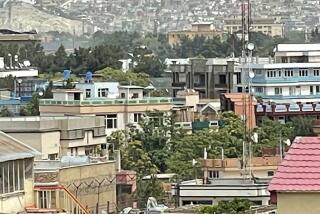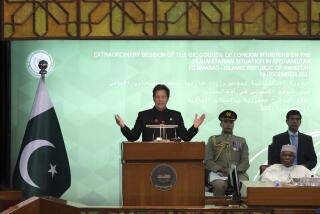Pakistan’s Role in Afghanistan
- Share via
Re “In This Crisis, Avoid Giving Away the Store to Pakistan,” by Shireen T. Hunter, Commentary, Oct. 3: Both Pakistan and the U.S. were aligned with the Taliban. In 1996, the Taliban were welcomed by the Afghan people because they presented a credible alternative to the lawlessness and chaos to which Afghanistan had descended under the brutal rule of Ahmad Shah Masoud. Several other commanders joined the Taliban. The majority of the Taliban, who had served as commanders and fighters during the anti-Soviet campaign, knew how to handle sophisticated weapons and did not need to be taught.
During the Cold War, Pakistan supported all Afghan factions, including Burhanuddin Rabbani’s Jamiat-e-Islami. It was the accord brokered by Pakistan among various Afghan factions that brought Rabbani and Masoud to power. Clearly, Pakistan was not opposed to any Afghan moujahedeen leaders, including Masoud.
Hunter failed to mention the efforts made by Pakistan to advise the Taliban to meet international concerns on terrorism, reform their primitive social policies and dissuade them from destroying Afghanistan’s archeological heritage.
Hunter grudgingly conceded that Pakistan is not responsible for all of Afghanistan’s problems. The entire international community is responsible for the mess in which Afghanistan finds itself today. The precipitous disengagement of the West from Afghanistan, immediately after the conclusion of the last and most significant battle of the Cold War, left the Afghans to fend for themselves. Pleas for a reconstruction program were rejected. No wonder Afghanistan became a breeding ground for extremism and terrorism.
Asad Hayauddin
Press Attache
Embassy of Pakistan
Washington
More to Read
Sign up for Essential California
The most important California stories and recommendations in your inbox every morning.
You may occasionally receive promotional content from the Los Angeles Times.













